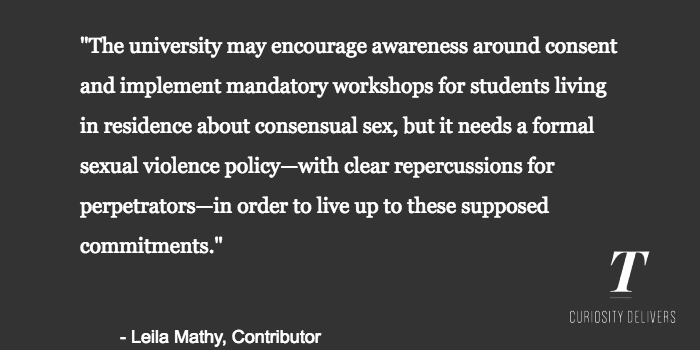McGill University is one of the safest spaces I’ve ever been in. Never in my life have I ever been made so aware of issues of race, sexuality, consent, and gender. This university opened my eyes to topics I had rarely thought about in-depth and made me a far more open-minded and socially-aware person. I know for a fact that I’m not the only person to have felt the impact of this experience, so I was disappointed and angry when I was informed that McGill does not yet have a sexual assault policy. I, and many others, feel betrayed. The university may encourage awareness around consent and implement mandatory workshops for students living in residence about consensual sex, but it needs a formal sexual violence policy—with clear repercussions for perpetrators—in order to live up to these supposed commitments.
McGill is not the only university with this problem: Fewer than 20 per cent of Canadian universities have official sexual violence policies. McGill released its Draft Policy for Sexual Violence on Sept. 12; however, the draft is severely lacking in its punitive measures. The point of this policy should be to ensure that no survivor ever has to see, interact with, or feel threatened by the presence of their attacker on campus. In the case of a confirmed case of sexual violence, the policy must validate the survivor’s importance and worth by employing strict punitive measures. In short, the policy must send a clear message that sexual assault is not tolerated at this institution.
The biggest problem with this policy isn’t how long it’s taken to come together, or how many times it was previously rejected. The biggest problem, by far, is the message this sends to students on campus: This policy is more careful about wrongfully convicting someone than it is about the survivor’s well-being. While it should be concerned with both, false accusations are very, very rare—only 2 to 4 per cent in Canada. This draft tells survivors that they would have to live with their attacker on campus and that the perpetrator’s freedoms, comfort, and educational experience are valued at the expense of their own.
Instead, McGill University, in the vaguest terms possible, only asserts in clause 9 of the draft that the survivor will have access to support systems. In addition, clause 12 states that “the appropriate University authority may initiate an investigation or disciplinary process.” The policy draft fails to quantify resources and assert concrete measures. The repeated use of the word “may” makes it vague and noncommittal. This weak attempt at addressing the problem of sexual assault on campus does nothing to eliminate rape culture—the dangerous culture that normalizes and excuses sexual violence instead of condemning it. This policy would be so much more significant if McGill specified exactly what resources it will devote and what actions it will take to respond accordingly.
The draft’s harshest punitive measure, in clause 18c, is “temporarily excluding the alleged perpetrator from campus or limiting that person’s role, privileges or duties, in accordance with applicable University policies, regulations and collective agreements.” No suspension, no expulsion, and a lot of leeway. Without the threat of expulsion, perpetrators can get away with sexual violence and know that they will still get a second chance. There is too much wiggle room for perpetrators to slip through the cracks, because the draft in its current state doesn’t hold McGill to any concrete action. This creates a risk of not holding all perpetrators and cases to the same standards. With a justice system that doesn’t seem invested in helping rape survivors, universities need to create as safe a space as possible for members of their community. In fact, survivors of sexual violence in Canada have received so little help in their cases that many would rather stay silent altogether.
Failing to include real, concrete, and harsh punitive measures is what makes this policy severely lacking. McGill’s job isn’t to only educate its students—it’s to create a safe space for the educating to take place in. This is even something the university acknowledges that it is obligated to do in clauses 7 and 8 of the Charter of Student Rights, yet, so far, it seems to be failing in this instance. Given that so few universities in Canada have policies for sexual violence, McGill’s policy has the opportunity be extremely precedent-setting. The campus I thought was a safe space is one where many feel at risk. An administration that isn’t willing to take definitive punitive measures in dealing with perpetrators of sexual violence is not one that is creating a safe space.









